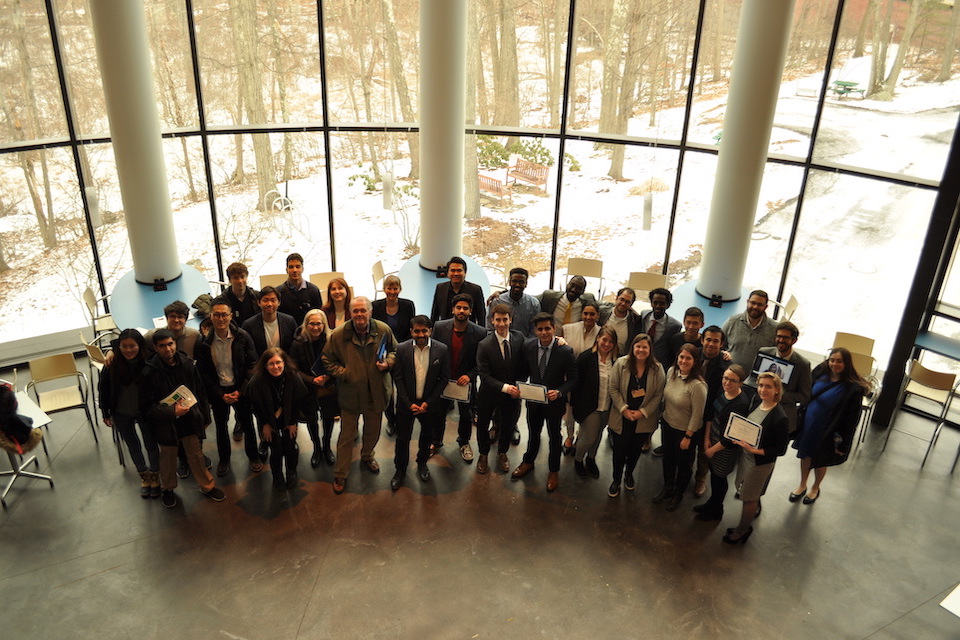High-Impact Projects Dominate 5th Annual SparkTank

Teams Are Already Showcasing at Regional Events
SparkTank is an annual tradition at Brandeis. The startup competition, styled after the popular TV show, showcases the best of Brandeis startups. Students compete on an equal footing with faculty and staff, pitching their startups to compete for a pool of $50,000 in funding. For these Brandesian startups, it’s the culmination of months of work, perfecting their presentations, researching the target markets for their inventions, and, of course, creating innovations that have the power to change the world. This year’s competition was no exception. Startup teams impressed a distinguished panel of Boston judges with their passion, creativity, and technical know-how. In addition, just days out from the event, several of the winners are making regional debuts on the Boston startup scene. It’s what we’ve come to expect from SparkTank.
What was unique this year was a great commitment than ever to social causes. Every year, in the spirit of Brandeis’ commitment to social justice, many of the competing teams aims for social impact as their primary goal. This year, nearly all did. Most startups either aim specifically to address a social issue, or are in a sector, such as education, with a social-good mission.
Meet Some of This Year's Winners
Innovators competing this year included teams addressing sustainability, health, peace and conflict, and women’s issues. Ranging from graduate students to a first-year undergraduate, the startup leaders also came from every part of Brandeis, including The Heller School for Social Policy and the International Business School. Here are some of the winners:
Little Dove Studios aims to build understanding between Israeli and Palestinian youth through media. Their initial plan includes a graphic novel, which they hope to turn into a feature film. To ensure representation, they plan to crowdsource the plot points for the novel and film, asking Palestinian and Israel readers to direct the ways in which characters are portrayed, how the story unfolds, and the overall creative direction. It’s the brainchild of Peace, Conflict, and Coexistence students Andrew Hirsh and Abdul Rehman. They will be showcasing again soon at Mass Innovation Nights, Pi Day Edition at Brandeis on March 14, 2019.
NeerChakra addresses a critical women’s and environmental challenge: many women in rural India must travel up to 5 hours daily to obtain water for their households. Through the use of a simple rolling water urn, NeerChakra plans to equip women with an easier way to carry water home, thereby reducing trips by 80%. In areas not served by wells for environmental or geologic reasons, it will free rural women to pursue education, small businesses, or social opportunities. Heller students Resham Sethi and Ekow Damoah partnered with independent inventor Tanveer Inamdar to create it. A few days after winning funding at SPARKTank, they were selected to pitch at Innovate128, a regional pitch event, where they won honorable mention.
iRemember is an app designed to help the 50 Million people worldwide who suffer from dementia remain independent. Created by undergraduate Olivia Hoy, with help from first-year student Ryan Xu, it’s also designed to give caregivers peace of mind by reminding dementia patients of mealtimes, appointments, and medications. With the potential to save millions of dollars in healthcare costs, provide dignity to those living with the condition, and help elders age in place, it’s a high-impact invention born right here at Brandeis.
Grand Prize winners SpeechFlow address a common challenge in the education sector: making the slide decks faculty use engaging. They aim to make lectures more dynamic--and save faculty time--by leveraging Google Assistant in a new way the team developed here at Brandeis. COSI team Kyung Hyun Kim, Huaigu Lin, Sam Ruditsky, all undergraduates, created the winning technology.
Innovating the Everyday
If this year’s new crop of startups has another common thread, it’s a desire to improve everyday life. From giving voice to average citizens caught up in conflict, to fixing the challenges of caregiving, household management, or PowerPoint, these teams look at everyday people and their challenges and think: “How can we make things radically better?”